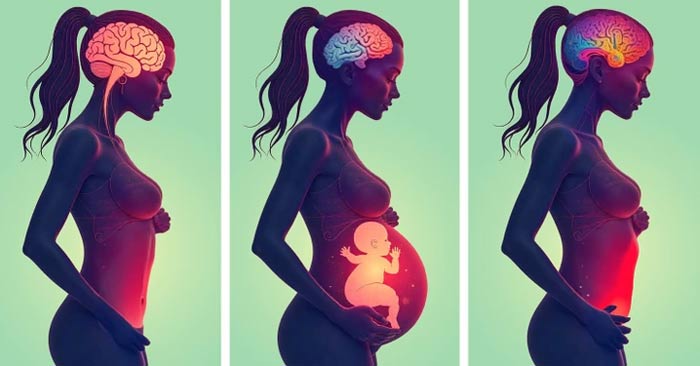Science discovers pregnancy permanently changes the brain
Before and after pregnancy, a woman's brain changes significantly . Science has discovered that pregnancy permanently changes the brain in the following ways.
Pregnancy is often thought of as a time of profound change, but while the physical transformations take center stage, there's an equally fascinating change happening in the brain. Recent research suggests that pregnancy reshapes the brain in extraordinary ways, enhancing the ability to connect with, care for, and respond to the baby. Here's what research is discovering about the 'baby brain'—and why it's much more complex than previously shared.

As early as the ninth week of pregnancy, the brain begins to undergo significant changes.
Scientists found that of the 400 brain regions studied, 80% showed a decrease in grey matter, especially in areas involved in understanding emotions and building social connections. While this 'pruning' process may seem alarming, it indicates that the brain is functioning more efficiently. Dr. Elseline Hoekzema, head of the pregnancy and brain laboratory at the University Medical Center Amsterdam, explains that these changes are closely related to maternal instinct. 'Brain changes during pregnancy are related to how the mother's brain and body respond to the newborn,' she says.
These neurological adjustments are not only related to bonding with your baby, but also prepare mothers to handle the emotional and social challenges of parenting, such as staying calm during sleepless nights or understanding their baby's cries.
Losing keys, getting foggy-headed, or being forgetful—many moms-to-be joke about having 'baby brain.'
The reality behind this phenomenon is more inspiring than inconvenient. As pregnancy hormones like estrogen and progesterone surge through your body, they reshape key areas of your brain, especially those responsible for empathy and emotional processing.
Dr. Emily Jacobs, a neuroscientist at the University of California, Santa Barbara, explains that these changes are designed to make the brain more specialized for motherhood. She emphasizes that the reduction in brain volume during pregnancy is not a negative phenomenon. Instead, she likens it to a sculptor chiseling away at marble to create something extraordinary. ' You can see the brain sculpting happening week by week, ' she says.

While pregnancy hormones play an important role in these changes, they are only part of the "equation."
Parenting is not limited to biological mothers. Fathers, adoptive parents, and other caregivers also exhibit nurturing behaviors as their brains adjust to the demands of caregiving. Parenting researcher Dr. Jonny Kohl emphasizes that the brain begins preparing for the transition to parenthood much earlier than is commonly thought. He further explains that parenting is complex, shaped by upbringing, observational learning, and a range of environmental influences.
Pregnancy hormones open a unique 'learning window'.
Researchers believe that pregnancy increases the brain's sensitivity to signals from the baby. Dr. Ronald Dahl, a neuroscientist at the University of California, Berkeley, explains that pregnancy hormones trigger neurological changes that alter priorities and motivation.
These changes 'make the individual more sensitive to finding ways to adapt and make connections, and develop greater expertise in responding to the infant.' Even white matter, the brain's communication network, undergoes improvements during pregnancy. It becomes more streamlined, like smoothing out a bumpy road, enhancing the brain's ability to coordinate functions and stay in tune with the baby's needs.

These changes are not limited to childbirth.
Some brain changes, such as increased white matter, decrease after childbirth, while others have longer-lasting effects. For example, decreases in gray matter volume in certain regions can last up to two years after birth.
Dr Jacobs describes these shifts as 'permanent imprints in the brain' that are designed to enhance a mother's emotional sensitivity and responsiveness to her baby. Remarkably, the researchers found these changes to be so pronounced that they successfully trained a computer to determine whether a woman was pregnant based on brain scans alone.